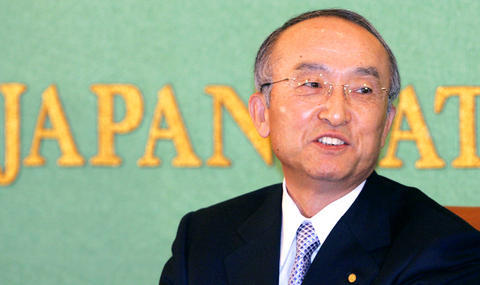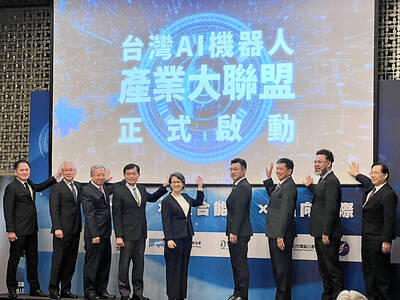Toyota's president acknowledged the company's rapid global growth was partly behind a surge in problems that has plagued the Japanese automaker in recent years.
Toyota Motor Corp president Katsuaki Watanabe said the company has improved quality controls and is sticking to its sales targets, including those in North America, despite worries about a credit crunch and a slowdown in the auto market.
Speaking at the Japan National Press Club, Watanabe noted the reasons behind the defects were varied, spanning development, design, production, suppliers and maintenance.

PHOTO: AP
But Watanabe said that at least some of the problems, including time pressures and shortage of experts, stemmed from the company's dramatic growth in recent years.
"That is not zero," Watanabe told reporters, referring to quality problems rooted in the company's expansion.
Watanabe has generally been frank about acknowledging challenges facing the company as it enters markets and builds new plants.
Still, his comments highlight a sense of crisis at Toyota, which is trying to maintain its sterling reputation for quality as it seeks to expand globally, especially in emerging markets such as China, Russia and Brazil.
"The fact that Toyota is growing globally suddenly shouldn't be used as an excuse," Watanabe said.
Last year Toyota, which makes the Prius gas-electric hybrids and Camry sedan, overtook General Motors Corp as the world's No. 1 automaker in global vehicle production, although Detroit-based GM still retains the top spot in global vehicle sales.
Toyota made a record 9,497,754 vehicles worldwide last year, up 5.3 percent from the previous year, beating GM at 9.284 million. But Toyota sold fewer vehicles at 9.366 million to GM's 9,369,524 vehicles. GM has been the world's top seller for 77 years.
Watanabe said he had ordered a six-month delay in some products since the problems surfaced to tackle quality controls. He did not give details.
Toyota has gone over, one by one, each problem, tracking root causes, analyzing and coming up with ways to prevent a recurrence, Watanabe said.
He even referred to a trend he dubbed "big company disease" caused by arrogance among its ranks.
Since 2006, when the alarming rise in recalls began to surface, Watanabe has apologized repeatedly at news conferences in Japan.
He also said he was aware of the concerns about falling US auto sales amid a slowdown in the US economy.
This year is expected to be the slowest in a decade for the US auto industry, but automakers are still predicting sales will pick up in the second half thanks to the federal stimulus package and pent-up demand.
Watanabe dismissed the worries. This year's overall US auto sales are likely to remain about the same as last year and Toyota is expecting its regional sales to rise on year, he said.
Toyota is expecting US sales this year to climb 1 percent from last year to 2.64 million vehicles.
"I feel US economic fundamentals are strong," Watanabe said.

The paramount chief of a volcanic island in Vanuatu yesterday said that he was “very impressed” by a UN court’s declaration that countries must tackle climate change. Vanuatu spearheaded the legal case at the International Court of Justice in The Hague, Netherlands, which on Wednesday ruled that countries have a duty to protect against the threat of a warming planet. “I’m very impressed,” George Bumseng, the top chief of the Pacific archipelago’s island of Ambrym, told reporters in the capital, Port Vila. “We have been waiting for this decision for a long time because we have been victims of this climate change for

MASSIVE LOSS: If the next recall votes also fail, it would signal that the administration of President William Lai would continue to face strong resistance within the legislature The results of recall votes yesterday dealt a blow to the Democratic Progressive Party’s (DPP) efforts to overturn the opposition-controlled legislature, as all 24 Chinese Nationalist Party (KMT) lawmakers survived the recall bids. Backed by President William Lai’s (賴清德) DPP, civic groups led the recall drive, seeking to remove 31 out of 39 KMT lawmakers from the 113-seat legislature, in which the KMT and the Taiwan People’s Party (TPP) together hold a majority with 62 seats, while the DPP holds 51 seats. The scale of the recall elections was unprecedented, with another seven KMT lawmakers facing similar votes on Aug. 23. For a

Taiwan must invest in artificial intelligence (AI) and robotics to keep abreast of the next technological leap toward automation, Vice President Hsiao Bi-khim (蕭美琴) said at the luanch ceremony of Taiwan AI and Robots Alliance yesterday. The world is on the cusp of a new industrial revolution centered on AI and robotics, which would likely lead to a thorough transformation of human society, she told an event marking the establishment of a national AI and robotics alliance in Taipei. The arrival of the next industrial revolution could be a matter of years, she said. The pace of automation in the global economy can

All 24 lawmakers of the main opposition Chinese Nationalists Party (KMT) on Saturday survived historical nationwide recall elections, ensuring that the KMT along with Taiwan People’s Party (TPP) lawmakers will maintain opposition control of the legislature. Recall votes against all 24 KMT lawmakers as well as Hsinchu Mayor Ann Kao (高虹安) and KMT legislative caucus whip Fu Kun-chi (傅崐萁) failed to pass, according to Central Election Commission (CEC) figures. In only six of the 24 recall votes did the ballots cast in favor of the recall even meet the threshold of 25 percent of eligible voters needed for the recall to pass,